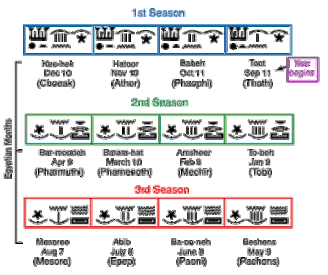
 |
Freethought & Rationalism ArchiveThe archives are read only. |
|
|||||||
|
|
Thread Tools | Search this Thread |
|
|
#1 | ||
|
Veteran Member
Join Date: Jun 2010
Location: seattle, wa
Posts: 9,337
|
Quote:
Quote:
|
||
|
|
|
|
#2 | |
|
Contributor
Join Date: Jan 2001
Location: Barrayar
Posts: 11,866
|
Quote:
|
|
|
|
|
|
#3 |
|
Veteran Member
Join Date: Jun 2010
Location: seattle, wa
Posts: 9,337
|
Well if Mead is right then the gospel measured the year in Egyptian months (Tybi = the fifth month). Why would the gospel writer have used Egyptian months to mark the beginning of the gospel narrative?
  The only question now is Mead correct in his analysis. I am not sure. He overstates what Clement tells us with respect to the gospel itself. Nowhere in the account in Clement does it say the Basilideans believed in the Holy Spirit came down as a dove. |
|
|
|
|
#4 | |
|
Veteran Member
Join Date: Jun 2010
Location: seattle, wa
Posts: 9,337
|
Mead backs up his assertion with a citation of material from the Pistis Sophia. Apparently the tradition is that Jesus descended and ascended on the same day (i.e. a full year ministry):
Quote:
|
|
|
|
|
|
#5 | |
|
Veteran Member
Join Date: Jun 2010
Location: seattle, wa
Posts: 9,337
|
Actually I take my hesitation back with Mead's retelling of the material. Apparently Smith agrees with him:
http://books.google.com/books?id=Ufg...gospel&f=false Here's how he translates the same material: Quote:
|
|
|
|
|
|
#6 | |||
|
Contributor
Join Date: Mar 2006
Location: Falls Creek, Oz.
Posts: 11,192
|
Quote:
Quote:
Quote:
|
|||
|
|
|
|
#7 |
|
Contributor
Join Date: Jan 2001
Location: Barrayar
Posts: 11,866
|
Ah! Thanks. Well.... what you're getting is how the Basilides read the gospel, not necessarily what it actually said.
Vorkosigan |
|
|
|
|
#8 | |||
|
Veteran Member
Join Date: Jun 2010
Location: seattle, wa
Posts: 9,337
|
Here is the original Greek:
Quote:
Quote:
Quote:
Here is Schneemelcher's summary of the Egyptian context of both the Pistis Sophia and the Basilidean gospel http://books.google.com/books?id=TDW...20Tybi&f=false |
|||
|
|
|
|
#9 |
|
Contributor
Join Date: Mar 2002
Location: nowhere
Posts: 15,747
|
1. You've talked about this passage from Clement three times now without ever given a proper reference to it. (Looks like 4th time lucky. If I were Genghiz Khan, I'd have your right hand.)
2. The second and 3rd rows of hieroglyphics are turned 180° from their proper orientation. 3. What those of Basilides say is not gospel. It could just be a gnostic transformation of 15th of the rule of Tiberius Caesar to 15th of Tybi that Clement records. I also cannot see a connection other than what appears to be a gnostic development. Do you think the gospel would for some reason be supplying a month without a year? |
|
|
|
|
#10 |
|
Veteran Member
Join Date: Jun 2010
Location: seattle, wa
Posts: 9,337
|
I am really tired. But the other factor to consider is that Clement specifically says that it is 28 years and 4 months from the one year ministry of Jesus to the destruction of Jerusalem. How can that be 'fifteenth year of Tiberius Caesar'?
|
|
|
| Thread Tools | Search this Thread |
|